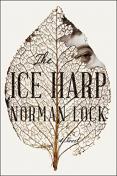
by Norman Lock
Paperback- $17.96
Click on the ORANGE Amazon Button for Book Description & Pricing Info
Overall rating:
How would you rate this book?
Member ratings
The Ice Harp, Norman Lock
Often, I was tempted to give up reading this book. Each sentence required a double reading to get its meaning. As metaphors flew off the page, my lack of literary knowledge was exposed. I wished that I was more literate with regard to the authors Emerson spoke to, so colorfully, in his imagination. Nathanial Hawthorne, Henry Thoreau, Walt Whitman, John Muir are just some of the familiar and unfamiliar names that appeared as he conjured them up or actually engaged with them. John Brown and he debated about slavery. Louisa Mae Alcott appears and nurses his injured guest who is a runaway slave. Lidian, his second wife, supports women’s rights and the Underground Railroad. The history of the times is exposed through his ramblings. Even some of the vocabulary words required me to have a dictionary at hand, since I had no idea what promulge meant, or taphophobia, or defalcator, or aspergillum, to name just a few of the words that confounded me.
Yet, I found the prose so brilliant, as Lock painted images on each page with his words, that I found that I could not give up on the book. Today one is hard pressed to find a book that is so well written, yet not dependent on politics, even though it appears throughout, not dependent on eroticism, though there are sexual innuendos, so not influenced by the “woke world”, though dysfunction existed then, as well as today. It was a welcome relief; so as hard as it was to read and comprehend, requiring extra time to reread and research some of the references and the language, it was one of the most positive experiences I have had in recent times. It restored my faith in the magic of good literature. Simply put, the author truly created a performance in the theater of my mind.
The author described his version of Emerson’s descent into the darkness of the aging process as Alzheimer's/dementia, which he may or may not have truly suffered from, or succumbed to, took over his life. One cannot help but appreciate and commiserate with the victim who suffered the indignity and trauma associated with the failure of the mind. The loss of words was very painful to Ralph Waldo Emerson, a man who lived for his words, who put them down on paper and influenced everyone who read them.
In this book, that imagines Ralph Waldo Emerson as a victim of hallucinations, his confusion and frustration are palpable to the reader. As he attempts to continue to function while he knows perfectly well that he is failing drastically in that effort, he is a catastrophe always waiting to happen. He starts fires, breaks windows, talks to strangers and to the friends in his imagination, some who are long dead. The tender and heartbreaking description of this brilliant man, as he falls deeper into a world without memories, feels very authentic. The author has deftly interwoven the political and social atmosphere of the day, and in one of Emerson’s final acts, he is conflicted about slavery and whether or not he should struggle actively against it, even if it is against the law to do so.
There is humor and pathos, both, in this incredible illustration of a mind that is failing as a life nears its end. Because there are no defined chapters, there is little opportunity for respite in much the same way as Emerson’s decline is occurring. His discomfort becomes the reader’s discomfort.
Book Club HQ to over 88,000+ book clubs and ready to welcome yours.
Get free weekly updates on top club picks, book giveaways, author events and more








